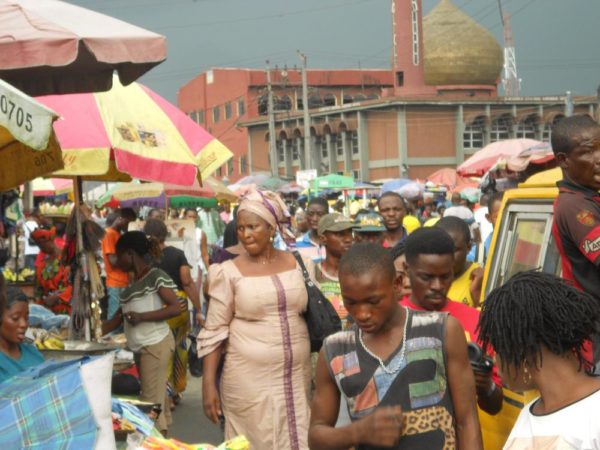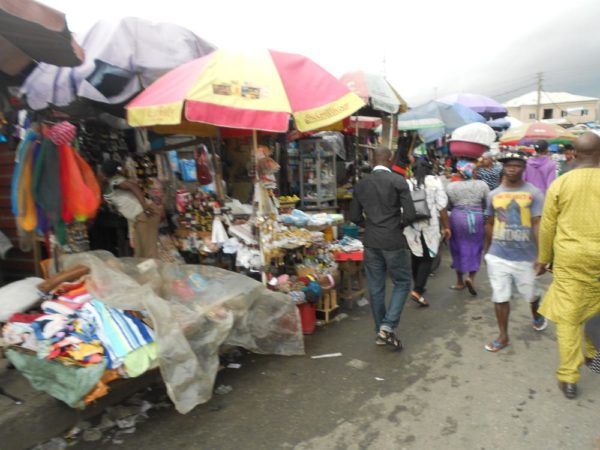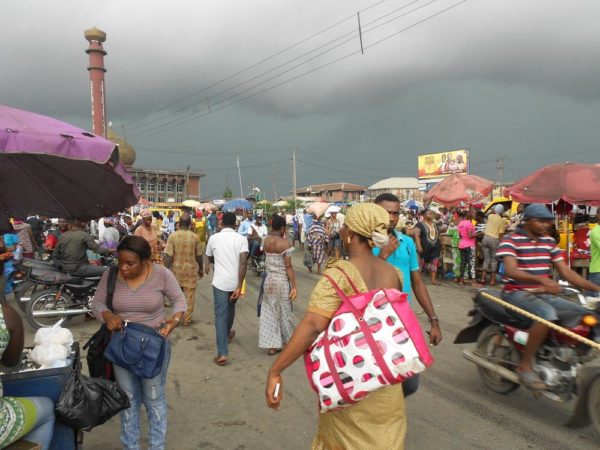 Tobi Osunkoya
was a meat seller before he became a bus driver. A stout pot bellied
man in a faded Ankara print Kaftan and with the patent cheerfulness of
aged people. He says this bit with unmistakable pride, perhaps to prove
that he has had other experiences besides the disorderliness that is the
Lagos driving sector. He says too that meat selling is a quite
profitable business , of course nothing like the violence that is Lagos
bus driving, without the brutish Agbero’s waiting at every bus stop for
you to press earnings into their palms, the scuttle for fares and the
serial appearance of vehicle vandals...
Tobi Osunkoya
was a meat seller before he became a bus driver. A stout pot bellied
man in a faded Ankara print Kaftan and with the patent cheerfulness of
aged people. He says this bit with unmistakable pride, perhaps to prove
that he has had other experiences besides the disorderliness that is the
Lagos driving sector. He says too that meat selling is a quite
profitable business , of course nothing like the violence that is Lagos
bus driving, without the brutish Agbero’s waiting at every bus stop for
you to press earnings into their palms, the scuttle for fares and the
serial appearance of vehicle vandals...
The place is Boundary market; it is
Christmas Eve. For Mr Tobi, however, it is like every other day. Perhaps
the increased number of fares to Ojuelegba and CMS make the
biggest/only difference; that passengers would hurry after him as
expected with last minute Christmas shopping elated him, I knew this
bit.
He is sitting inside his empty bus when I
arrive, talking to my partner, Ejiro, maybe about why I was running
late or maybe of something else, something trivial, perhaps why the
harmattan made it difficult for one to rise in the morning.
Ejiro does not reply my greetings; she
is upset that I arrive late. She does not know that hell hath no fury
like Lagos traffic on Christmas Eve, that even the bike I had boarded
when the buses seemed to move no more although prominent for slicing in
between narrow divides of cars was also somehow caught in traffic.
“The guy is down with Malaria,” She
says. She is talking about the photographer who was supposed to join us.
I nod flippantly, retie my sweater around my neck in bid to tackle the
cold someway and tease her about how beautiful she is looking, she
manages a laugh.
“I think we should start now,” I say,
but Mr Tobi does not clearly understand, I want to say it in Pidgin but
my Pidgin is not fluent, as with many other languages, I speak it with
the manacles of one accustomed to speaking English and oh, I hate this!
“Pa, make we start so we no go waste
time” Ejiro says in Pidgin and his eyes light up in comprehension. I
wish I were like her for one second, the effortlessness with which she
says it, without hesitating to think of the next word, the articulation.
My jotter is ready and so is my Lenovo
phone, whose modest recorder app would today play one of its biggest
functions in its one-month long history.
He tells us first that he grew up in a
discreet village somewhere in Ogun state, that when the meat selling
business became unprofitable and with the increasing, number of
unemployed graduates because of whom he saw no need for school, his
brother introduced him to a friend who gave him his bus to drive.
“Na so many people dey take start,” He says “Nobody dey buy bus on their own”
His answer, of course, postulates that
at some point people actually bought their own buses, that in a
good-looking future, they retired from splitting their day’s earnings
between them and their bus owners and worrying persistently about
damages and invasion from vandals.
Nevertheless,
this is not the case for him. Over ten years into the business of bus
driving and he has been unable to buy his own bus. He states this as his
biggest challenge, splitting his daily earning of slightly above
three-thousand naira between him and his bus owner, alongside starting
bus driving without a license.
“Without license, all of us start,” He
says again, generalising another detail and I feel a sudden sprint of
fear in my chest at the thought of drivers without licenses cruising
Lagos roads confidently.
Mr Tobi has five children, who attend
the tuition free school of the local government, and a daughter who is
married. I “Oooh” in exhilaration when he says this and we all laugh; it
is easily the only language we all understand, laughter. It is visibly
less confusing than my disturbing fuse of English and Pidgin (saved only
by Ejiro’s modifications), visibly less tasking.
And in that moment I realise how
beautiful laughter is, how collective, widespread, like fine-tasting
music, laughter is complete.
He says his earnings from bus driving is
enough for his family to live on, they are perhaps the sort who trimmed
their needs till they became wants and although I did not expect him to
say anything else, I really did believe him.
In future, Mr Tobi does not plan to
retire, age is catching up on him but he says this does not matter. He
plans rather to buy his own bus, things would get better then, he would
make more money and his kids would attend better schools. I imagine him;
better grizzled than is he now, frail bones and shaky hands, speeding
along Lagos roads and I marvel at such love for a profession considered
dreadful by many.
“Abeg, no join” is his advice when I say
peradventure I want to be a Bus driver, we all laugh, again, that
complete laughter, and yet I know he is dead serious, I can easily tell.
The sun is blistering when we walk away
from him, as if furious at the harmattan for taking its spotlight. It is
searing my skin and making my afro itch.
I regret bringing my sweater, but I do
not say a word to Ejiro, we do not say anything at all. Perhaps like me
she is coming to terms with a life that is so different from ours, with
trying to imagine how people lived it. Perhaps she is admitting to
herself that beyond the smiling face of Mr Tobi and his seemly vacant
expressions, there are simply stories we would never know and she was
comfortable with this admission, because I was.
Rasheed Onigbinde
has been driving for 27 years. The next driver we talk to, he is
youthful, properly dressed, in a trim Kaftan and glossy pointed shoes
that caught the sun’s rays and reflected it back at me like the flipside
of an oily frying pan and this stuns us.
With him, I can speak fluent English,
and although his replies are not exactly silver-tongued or void of
mistakes, they are more than one would expect from a bus driver, from
any uneducated person at all.
He speaks English with the custom
distantness and gratitude of one who mastered English simply by being
around educated people, the indebtedness to the language. He does not
own it, and frankly, I realise, neither of us do.
He was born in 1968 Ibadan and left in
form 3. He thus identifies more with Lagos as his childhood than the
rusty roofs of a hometown he left behind.
After he received freedom in 1986 from
the garage, in which he learnt to be a mechanic for four years, he
decided to go into driving. He believed his experience as a mechanic
would give him an edge over other drivers.
Luck smiled on him three years later, in
1989. A friend who perceived him fit introduced him to the business,
gave him his own bus, and in April 1990, a year after driving, he got
his first driving license.
He opens his wallet to show us the
laminated ID card before I can say it is not necessary and in that
moment, I get my first intuition about his personality. It is “self
assured” “bare all” and I admire these traits.
I look at Ejiro and I know she thinks these things too. I vow to ask her later but I do not remember.
He reminds us that driving for someone
initially came with its shortcomings and that this coupled with safety
issues, primarily armed robbery were the major challenges he faced.
“I understand the value of education and
I know how important it is,” he says when he discloses to us that he
has five children scattered in various universities and polytechnics
across the country.
He says this bit with plain
well-deserved pride, with the satisfaction that came from knowing his
children got all of what he did not and then again, I get my second
intuition about his personality. He is a “survivor”, a “I know what I
want”
Today, Rasheed Onigbinde is no more the
coy mechanic venturing into a business that could not assure him of a
decent future, he no more presses part of his day’s gains into the eager
palms of bus owners.
Today, he owns two buses, rarely drives
and is more active as the assistant secretary of the National Union of
road Members for the area, a post he is unsurprisingly very proud of.
His motive for joining the association
was simple “It is not fair that the people in the association are just
people, not drivers or past drivers who know what we pass through,” He
said “That’s why I joined the association, so I can represent my people,
better than anyone else, because I know what they want”
Today, he owns a house somewhere in
Lagos, receives over four-thousand naira daily from his drivers and
plans to retire in the future.
For him, life’s motto has always been “To make sure I know what I am doing, invest wisely and become a person in this world”
My heart leaps when he says this and I
find myself marvelling at this man content in his definition of ‘become a
person’, a definition my engineer Brother would call limiting and my
Pastor would frown at. I marvel at his insight and astuteness, it is
uncommon amongst bus drivers, or this perhaps is because I have never
spoken to any of them in this way.
I realise then that not everyone must
have big dreams, not everyone must want to win the Caine prize and be a
New York Times bestseller, go on book tours and sign thousands of books
for eager fans, or be granted audience at the White House. Not everyone
wants to be eulogized when they pass on by millions of people, or given a
star on the walk of fame.
For some however, these concepts of
dreams come in smaller pixels, imaginable, possible if one tried hard
enough, beyond reach, but still within reach. They are dreams, but they
are the feasible dreams, the “I can come to pass” dreams. But we all
must have dreams.
“It’s not about where you find yourself,
but what you do with it” is what he answers when I ask him of his
opinion on my joining bus driving and I am once more amazed that this
well-dressed man in pointy shoes teeming with wisdom and integrity never
had a University education.
We are ready to leave then and as I look at Ejiro, I know she is mad at the photographer for not showing up.
“My phone camera was not so bad in Mr Tobi’s photo,” I say as we leave the park “perhaps we should have used it with him too”
She waves me away; she does it often,
waving me away. It makes me mad and I wonder how she learnt it, but as
with every other thing, I do not say a word.
I do not want to ruin the moment; we are
too drowned in our thoughts. Outside, I wave at the man who introduced
us to them; he is calling passengers to another CMS bound bus.
“Thank you,” I say, he nods but I barely
see him, I am lost in my thoughts. I am thinking about Mr Tobi and Mr
Rasheed and about how similar their stories are- each a chunk of the big
cake that is life, each satisfied with this chunk.
I know I will go home and life would get
in the way, that I will watch my favourite Mnet shows and think less
about them, if at all. I know I will wish I can run into them someday
and wonder if they will remember me without assistance, or I might not
wish to run into them. I might toss my note pad into my closet, type and
dump it on one folder in my Laptop, misplace the recording and try to
juggle life as a single Lagos Boy and a feature writer.
Yet somehow, I know I will not do that. I
know I will write about them, about laughter, dreams, family, and the
harmattan. I know I will write about peace, self-satisfaction and
finding love in little things, because I believe that stories deserve to
be told, that every story deserves to be told.





No comments:
Post a Comment